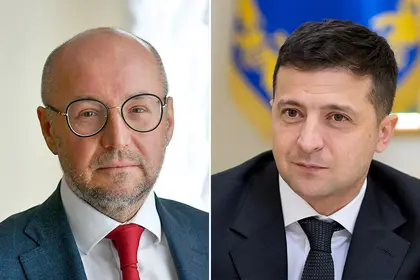Under President Volodymyr Zelensky, the National Security and Defense Council (NSDC) has become the most talked-about institution in the country.
Since early February, the body has imposed harsh sanctions on more than a dozen high-profile Ukrainian citizens who sided with Russia, including ousted ex-President Viktor Yanukovych and two current lawmakers, Viktor Medvedchuk and Taras Kozak, known for being close to the Kremlin.
JOIN US ON TELEGRAM
Follow our coverage of the war on the @Kyivpost_official.
The NSDC also mandated the Security Service of Ukraine (SBU) to look into the circumstances of the 2010 ratification of the so-called Kharkiv accords, the deal between Kyiv and Moscow to extend the lease on Russia’s naval base in the Crimea in exchange for discounts on gas.
In 2014, this fleet was in the vanguard of the Russian annexation of Crimea and the subsequent war against Ukraine. It allowed Russia to quickly seize 80% of Ukraine’s naval fleet during its illegal invasion of Crimea.
Oleksiy Danilov, the council’s secretary, described the agreement as “selling the country for a hundred dollars,” underlining that everyone involved in its signing will be held accountable.
It turns out there’s no need to look very far to find alleged wrongdoers.
According to an investigation by Radio Free Europe/Radio Liberty’s program Schemes, the NSDC’s first deputy secretary, Ruslan Demchenko, lobbied the signing of the Kharkiv accords.
On April 26, 2010, the Verkhovna Rada National Security and Defense Committee held a closed meeting to decide whether to put the lease extension on Russia’s naval base in Crimea to a vote in parliament.
Demchenko, who attended the meeting as then-deputy foreign minister, persuaded lawmakers into supporting the vote, according to the session transcript cited by RFE/RL.
“In the current situation, there is no other way out but to negotiate with the Russians to adjust the gas price and compromise,” Demchenko was quoted as saying.
During the meeting, Demchenko promoted the opinion that signing the Kharkiv accords would bring stability for Ukraine.
“This will not be a reason for the intensification of terrorist activity in the region or instability in Crimea,” he said, stressing that the “Russian fleet on Ukrainian territory contributes to the strengthening of European and regional security.”
The Committee could not reach a unified solution during the session — seven lawmakers supported putting the deal on the vote, and the other seven spoke out against it. Therefore, parliament had to make a final decision.
The next day, on April 27, 2010, the Verkhovna Rada voted on the lease on Russia’s Black Sea fleet. The majority supported a deal that was due to expire in 2017 to be prolonged for 25 years, until 2042. It was one of the most controversial votes in Ukrainian history.
In March 2021, the Foreign Ministry stated that Demchenko “was not involved in the preparation of the agreements.”
The Kyiv Post couldn’t reach Demchenko for comment.
Demchenko worked as Deputy Foreign Minister from 2010 to 2014. In Sept. 2014, he was appointed an adviser to then-President Petro Poroshenko, and in July 2019 became an adviser to Zelensky. He has been the first deputy secretary of the NSDC since June 2020.
High treason
Ukraine’s Prosecutor General Office believes that the deal between Yanukovych and Russian President Dmitriy Medvedev allowed an increase in the number of Russian troops in Crimea, creating preconditions for the peninsula’s occupation in 2014.
In January 2021, the State Bureau of Investigation reported suspicion of high treason to Yanukovych due to signing the deal.
According to the bureau, Yanukovych “artificially created the preconditions for increasing the number of Russian troops on the sovereign territory of Ukraine, under the pretext of receiving a discount on natural gas.”
Investigators concluded that the contracts between Naftogaz and Gazprom did not in fact reduce the price of Russian gas.
You can also highlight the text and press Ctrl + Enter




